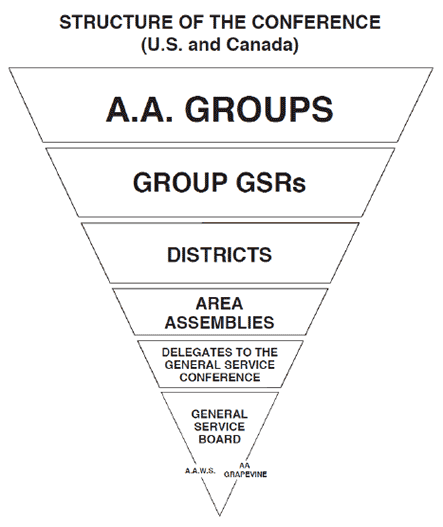AA Groups in District 15
If you want to know when and where these Groups meet, St. John's Intergroup maintains an active and up to date Meetings list.
Name
Step Sisters Book Study Group
Sunday Morning Action Group
Acorn Group
East End Group
Serenity Group
Pleasantville Group
West End Group
Cocktail Hour Group
Beaconsfield Group
Trepassey Group
Happy Hour Group
I Am Responsible Group
One Day At A Time Group
Unity Group
Recovery Group
Sobriety and Beyond Group
Second Chance Group
A Reason To Believe Group
Back To Basics Group
Better Life Group
Plain And Simple Group
Women For Recovery Group
Winners In Sobriety Group
Miracles In Sobriety Group
First Step Group
Alone No More Group
Read & Share Group
Health Science/ Waterford Gp
3rd Tradition Group
Keep it Simple Group
Freedom Of Choice Group
Helping Hands Group
New Hope Group
Primary Purpose Online Group
Off The Wall Group
Experience Strength & Hope
Sobriety for Lunch Group
Surrender To Win
Early Sobriety NL Meeting
New Found Meeting
11th Step Meditation Meeting
Recovery Center Meeting
Courage To Change Group
Why should I join a group?!!!
At every meeting we hear "Join a group and get a sponsor!" But what exactly does that mean?!!!!! Well, we hope we can explain it a little bit. You can also get the experience, strength and hope of many members if you bring up that topic at a discussion meeting. It's often said (for good reason) that a group is the heartbeat of AA.
Before we get into just what a group is, here's what one member shared: "What is an A.A. Home Group? Traditionally, most A.A. members through the years have found it important to belong to one group which they call Home Group. This is the group where they learn to accept responsibilities and try to sustain friendships."
How do you pick a group to join? Sometimes people join the group they went to for their first meeting. A good reason! Sometimes people like the folks they meet at a particular meeting and decide that's the group for them. Sometimes our schedules choose our home group - we find we can always get to a Friday night or Saturday meeting but not others. All good reasons. Members sometimes join a group that has few members but many people attending their meeting - so they need help! Another good reason! The important point is to join.
"The entire structure of A.A. depends upon the participation and conscience of the individual groups, and how each of these groups conducts its affairs has a ripple effect on A.A. everywhere. Thus, we are ever individually conscious of our responsibility for our own sobriety and, as a group, for carrying the A.A. message to the suffering alcoholic who reaches out to us for help. A.A. has no central authority, minimal organization, and a handful of Traditions instead of laws. As co-founder Bill W. noted in 1960, “We obey [the Twelve Traditions] willingly because we ought to and because we want to. Perhaps the secret of their power lies in the fact that these life-giving communications spring out of living experience and are rooted in love.”
A.A. is shaped by the collective voice of its local groups and their representatives to the General Service Conference, which works toward unanimity on matters vital to the Fellowship. Each group functions independently, except in matters affecting other groups or A.A. as a whole. A.A.’s essential group work is done by alcoholics who are themselves recovering in the Fellowship, and each of us is entitled to do our A.A. service in the way we think best within the spirit of the Traditions. This means that we function as a democracy, with all plans for group action approved by the majority voice. No single individual is appointed to act for the group or for Alcoholics Anonymous as a whole.
Each group is as unique as a thumbprint, and approaches to carrying the message of sobriety vary not just from group to group but from region to region. Acting autonomously, each group charts its own course. The better informed the members, the stronger and more cohesive the group — and the greater the assurance that when a newcomer reaches out for help, the hand of A.A. always will be there. Most of us cannot recover unless there is a group. As Bill said, “Realization dawns on each member that he is but a small part of a great whole. … He learns that the clamor of desires and ambitions within him must be silenced whenever these could damage the group. It becomes plain that the group must survive or the individual will not.”
The difference between an AA meeting and an AA Group is this:
"Most A.A. members meet in A.A. groups as defined by the long form of our Third Tradition. However, some A.A. members hold A.A. meetings that differ from the common understanding of a group. These members simply gather at a set time and place for a meeting, perhaps for convenience or other special situations.
The main difference between meetings and groups is that A.A. groups generally continue to exist outside the prescribed meeting hours, ready to provide Twelfth Step help when needed. A.A. groups are encouraged to get listed with G.S.O., as well as with their local offices: area, district, intergroup or central office. "
Extract from the AA pamphlet, The AA Group: Where it all Begins
The AA Group
The A.A. Group — the Final Voice of the Fellowship
“Alcoholics Anonymous has been called an upsidedown organization because “the ultimate responsibility and final authority for world services resides with the groups — rather than with the trustees, the General Service Board or the General Service Office in New York.” “Twelve Concepts For World Service Illustrated”
